Hardinxveld-Giessendam
Hardinxveld-Giessendam (Dutch pronunciation: [ˌɦɑrdɪŋksfɛlt ˌxisə(n)ˈdɑm] (![]() listen))[6] is a municipality in the western Netherlands, in the province of South Holland. It is located about 10 km east of Dordrecht, on the river Beneden-Merwede. The municipality had a population of 18,051 in 2019 and covers an area of 19.35 km2 (7.47 sq mi) of which 2.44 km2 (0.94 sq mi) is water.
listen))[6] is a municipality in the western Netherlands, in the province of South Holland. It is located about 10 km east of Dordrecht, on the river Beneden-Merwede. The municipality had a population of 18,051 in 2019 and covers an area of 19.35 km2 (7.47 sq mi) of which 2.44 km2 (0.94 sq mi) is water.
Hardinxveld-Giessendam | |
|---|---|
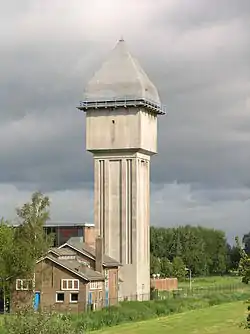 Water tower Hardinxveld | |
 Flag Coat of arms | |
.svg.png.webp) Location in South Holland | |
| Coordinates: 51°49′N 4°50′E | |
| Country | Netherlands |
| Province | South Holland |
| Established | 1 January 1957[1] |
| Government | |
| • Body | Municipal council |
| • Mayor | Dirk Heijkoop (CDA) |
| Area | |
| • Total | 19.35 km2 (7.47 sq mi) |
| • Land | 16.91 km2 (6.53 sq mi) |
| • Water | 2.44 km2 (0.94 sq mi) |
| Elevation | 3 m (10 ft) |
| Population (January 2019)[5] | |
| • Total | 18,051 |
| • Density | 1,067/km2 (2,760/sq mi) |
| Time zone | UTC+1 (CET) |
| • Summer (DST) | UTC+2 (CEST) |
| Postcode | 3370–3373 |
| Area code | 0184 |
| Website | www |
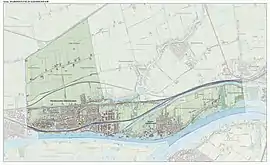
The municipality of Hardinxveld-Giessendam consists of the two population centres Giessendam/Neder-Hardinxveld and Boven-Hardinxveld. Until they were merged in 1957,[7] Giessendam and Hardinxveld were two municipalities, consisting of only a few streets and dykes and only a few thousand inhabitants.
The town's economy is for a large part dependent on ship building (e.g. Damen Shipyards Group) and general contracting. Several industry parks are present.
History
The village Hardinxveld is one of the oldest settlements of the Alblasserwaard. It is known that in 1105 a priest was present here, and therefore a church as well. Since 1282, Hardinxveld became a grand fiefdom. Through the centuries it suffered from warfare such as the Gelder Wars and the Eighty Years' War
The name Giessendam first appeared in 1231 and is most likely derived from the dam on the little peat river Giessen. This dam was the boundary between Hardinxveld and Giessendam for a long time.
The municipality was formed in 1957 by the merger of the former municipalities Hardinxveld and half of Giessendam. The rest of Giessendam's territory went to the new municipality of Giessenburg which in turn was merged with Giessenlanden in 1986.
Since the 1960s, the municipality has grown significantly through the development of new neighbourhoods such as De Peulen, de Wielwijk, de Westwijk, and Tienmorgen. In recent years, the municipality had serious fiscal problems, resulting in direct oversight by the Province for a period of time. Considerable savings had to be made, necessitating significant increases to the relative low taxation in the town.
Archeology
Before the construction of the Betuweroute Highspeed Railway, thorough soil research was performed in 1997. During that research in Hardinxveld-Giessendam, some archeological items were found, including a 7500-year-old skeleton of a woman, now named "Trijntje". It is the oldest skeleton found in the Netherlands up to this time. Since December 2003, the reconstructed corpse has been added to the collection of the Rijksmuseum van Oudheden (National Museum of Antiquities) in Leiden. In April 1998, a dugout canoe was found.
Transportation
The Hardinxveld-Giessendam railway station, on the Elst–Dordrecht railway, is situated in the municipality.
Notable people
.jpg.webp)
- Job de Ruiter (1930 in Giessendam – 2015) a Dutch politician, diplomat and jurist
- Kommer Damen (born 1944) a Dutch billionaire, and the chairman of Damen Shipyards
- Bert de Ruijter (born 1952 in Hardinxveld) known as Leigh Blond, is a Dutch composer, singer and songwriter.
- Erik de Bruin (born 1963 in Hardinxveld-Giessendam) a record-holding retired Dutch discus thrower and shot putter
- Jai Wowor (born 1997 in Hardinxveld-Giessendam) a member of boy band B-Brave founded in 2013
Gallery
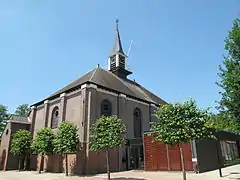 Boven-Hardinxveld, church
Boven-Hardinxveld, church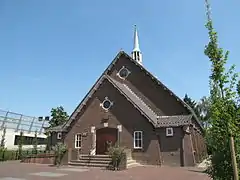 Hardinxveld-Giesendam, church
Hardinxveld-Giesendam, church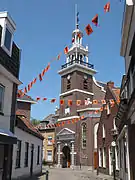 Hardinxveld-Giesendam, church
Hardinxveld-Giesendam, church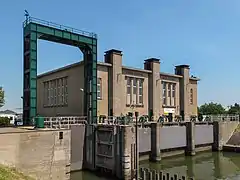 Boven-Hardinxveld, pumping-engine
Boven-Hardinxveld, pumping-engine
References
- "Historie" [History] (in Dutch). Gemeente Hardinxveld-Giessendam. Archived from the original on 10 May 2013. Retrieved 26 July 2013.
- "Collegeleden" [Members of the board] (in Dutch). Gemeente Hardinxveld-Giessendam. Archived from the original on 10 May 2013. Retrieved 26 July 2013.
- "Kerncijfers wijken en buurten 2020" [Key figures for neighbourhoods 2020]. StatLine (in Dutch). CBS. 24 July 2020. Retrieved 19 September 2020.
- "Postcodetool for 3371AL". Actueel Hoogtebestand Nederland (in Dutch). Het Waterschapshuis. Retrieved 26 July 2013.
- "Bevolkingsontwikkeling; regio per maand" [Population growth; regions per month]. CBS Statline (in Dutch). CBS. 1 January 2019. Retrieved 1 January 2019.
- In isolation, Giessendam is pronounced [ˌɣisə(n)ˈdɑm].
- Ad van der Meer and Onno Boonstra, Repertorium van Nederlandse gemeenten, KNAW, 2011.
External links
| Wikimedia Commons has media related to Hardinxveld-Giessendam. |
- Official website
- J. Kuyper, Gemeente Atlas van Nederland, 1865-1870, "Giessendam". Map of the former municipality, around 1868.
